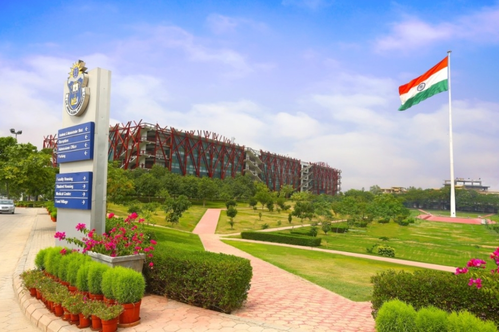Sonipat: Jindal Global Law School (JGLS) of the O. P. Jindal Global University (JGU) continues its knowledge production with a shifting focus on interdisciplinarity.
JGLS researchers published over 175+ publications in a variety of Scopus-indexed sources in 2023, representing an increase of over 25 per cent over the previous year and has surpassed the total number of similar publications from the top 4 National Law Schools in the country by over 60 per cent. The research has been published in some of top ranking and renowned journals globally.
In previous years, JGLS faculty members had published highly impactful research in some of the world’s most renowned law journals. While they continue to influence decision-making through similar publications, mindful of the larger global reconstitution of human socialisation, JGLS has strategically shifted its focus on knowledge that goes beyond conventionally set disciplinary boundaries.
On the shifting focus and this result, C. Raj Kumar, Founding Vice Chancellor of O.P. Jindal Global University and Founding Dean of Jindal Global Law School, said, “It is a strong and well-informed conviction that contemporary global issues require global approaches.
“Being global in willing and acting is the founding motto and functional style of JGU. We also strongly feel that limiting oneself to the parochialism of disciplinary loyalty is epistemic injustice, at least in our times. It is with such equitable sentiments that the faculty members of JGLS and JGU engage in interdisciplinary research.
“There is no disciplinary disloyalty here. That is to say, instead of breaking their own disciplinary convictions, they have invited expertise from other disciplines in the form of collaborations. Their openness to knowledge, in the spirt of, and reiterating, the classical Indian wisdom, Aano bhadra krtavo yantu vishwatah (Let noble thoughts come to us from everywhere”), has caused this extraordinary result. I thank and congratulate the faculty members of JGU for their extraordinary contributions to this achievement.”
The various law journals where JGLS faculty members have published their legal and interdisciplinary research include:
• King’s Law Journal
• Statute Law Review
• Oxford University Commonwealth Law Journal
• Liverpool Law Review
• International Arbitration Law Review
• Journal of Intellectual Property Rights
• Asian Journal of International Law
• Australian Feminist Law Journal
• International Review of Law, Computers and Technology
Prof. (Dr.) C Raj Kumar has also highlighted that, “Interdisciplinarity being the future approach to knowledge production, JGU has established the Office of Interdisciplinary Studies for building frameworks—clusters, networks, loops, and incubators—for the production and dissemination of interdisciplinary knowledge. All schools of JGU, including JGLS, will be the beneficiaries of this Office”.
The interdisciplinary forums where JGLS faculty members have published include:
• Journal of Asian Security and International Affairs
• Onati Socio-Legal Series
• Social Science and Medicine
• Sexual and Reproductive Health Matters
• Healthcare
• Journal of Religion and Popular Culture
• Sophia Studies in Cross-cultural Philosophy of Traditions and Cultures
• The Routledge Handbook of Mega-Sporting Events and Human Rights
• Legal Pluralism and Critical Social Analysis
• Handbook of Research on Exploring Gender Equity, Diversity, and Inclusion Through an Intersectional Lens
• Women and Criminal Justice
• European Journal of Risk Regulation
• Canadian Journal of Development Studies
• Contemporary South Asia
• Journal of Data Protection and Privacy
In the year 2023, over 50 per cent of the publications by JGLS that featured in Scopus-indexed forums were achieved through inter-institutional collaborations with various national and international institutes of repute.
The school has built a research ecosystem – based on the slogan of “publish and flourish” – that is more congenial for the production of interdisciplinary knowledge, which includes faculty conversation series, writers’ boot camps, research colloquia, meet the author/publisher series, and reading groups.
Kumar has added that, “Interdisciplinary is achieved by making interdisciplinary connections to happen. This includes opportunities for faculty members with diverse disciplinary backgrounds to connect and collaborate. JGU’s infrastructural design has many “nudges” that bring highly resourceful faculty members, who would have otherwise remained in their silos of production, to come together and discover possibilities.”
Dipika Jain, Vice Dean (Research) at JGLS explains how school prompts research among faculty members.
Jain said: “Research is not an art that can be taught. It is an urge, an urge to self-express and to break the silence. In order to have that urge there should be “inspiration”. Hence, the school has been inviting inspiriting writers and scholars to speak to aspiring writers and share their writing experience, their ways of breaking the silence, and their styles of expressing with the latter.
“Along with providing orientations in methods and materials, we invest faith in producing that “essential spark” – the flow – which could ignite ideas and help young writers to recognise their voice.”
–IANS


Comments are closed.